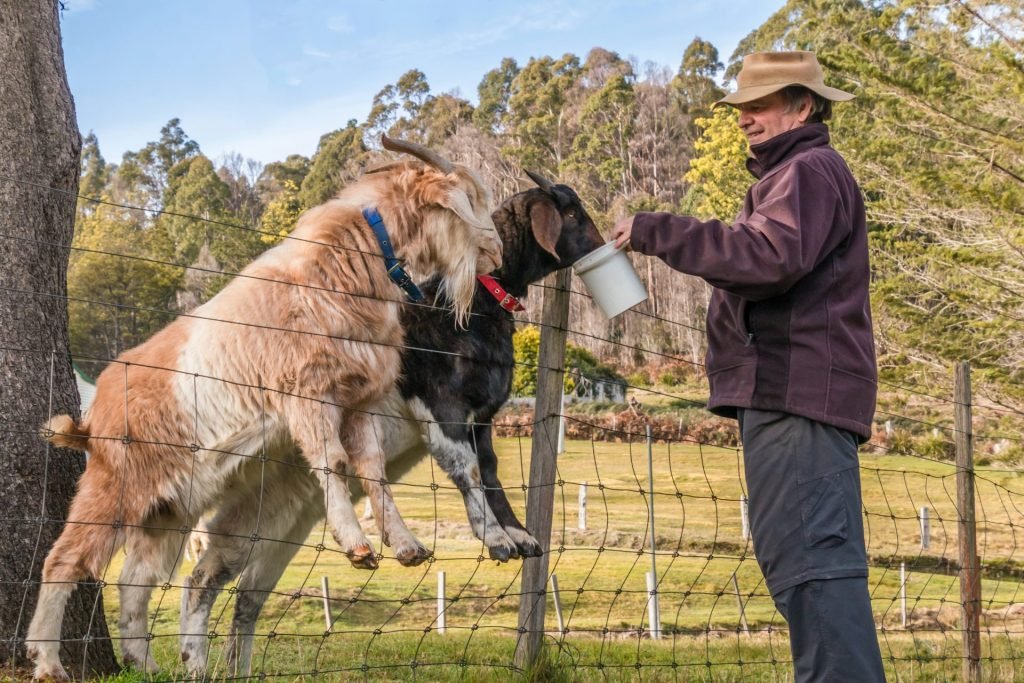
For the past century, the trend in North America and globally has been of increasing numbers of people moving away from small farms and ranches and into cities. Those who want to retain their self-sufficient way of life struggle against policies and strong market forces that favor big agribusiness. For decades, constant stress has led to a current severe mental health crisis among farmers. Farming and ranching families need and deserve our help. We’ve listed below some ways to sustain those currently operating.
Many farmers and ranchers prefer to sell to those who want to continue their land use, instead of selling to real estate developers. Below are some ways to keep the land profitable or to help soon-retiring farmers to transition the care of their land to younger caretakers, possibly with the option for the sellers to stay on their land for their retirement years. As another option, farming families can invite in seasonal or long-term workers to form a farming team. Incoming members can learn from farmers as they gradually take on more tasks. Long-term work contracts might include gaining a share in profits, rent-to-own, or a lifetime housing lease.
Many young people are interested in ways to set up a new small farm or ranch. Some may find purchase more feasible through collective ownership of the land as a residential intentional community, or collective ownership of the farming business. See the Match for Free page linked in the header to find potential buyers for your land or to team up as co-buyers.
7
Ways to save small farms and ranches
1. Conservation easements (team up for a DIY conservation easement)
Small nearby farms could band together as a non-profit that owns the several farms. They can still pay themselves a salary but have less tax burden. Small agricultural producers must meet a certain acreage threshold to stay in a lower tax bracket, but tax is still a substantial burden, constantly threatening the survival of some farms. Farms and ranches larger than 40 acres may find it feasible to complete the legal work needed for a conservation easement, with the help of a land trust. Some non-profit agencies are set up to help complete conservation easements for those that meet a size requirement, which can be smaller if there are unique considerations such as being adjacent to a natural park or offering migratory passage. This legislation eases the tax burden and keeps the land from ever being sold for other types of development than what is written into the contract. The Audubon Society or Nature Conservancy may purchase smaller land parcels that meet wilderness or habitat criteria. See the list of conservation land trusts linked in the Resources section below.
2. Conserving resources
Many farmers and ranchers may bristle at the political and subculture differences that define the ecovillage movement. Yet some small farms have found it helpful to adopt permaculture practices for sustainability, such as water catchment. Many of these used to be practiced on traditional farms. The ecovillage page has many resources that may also fit the needs of small farms and ranches.
3. Organic farming
As weather patterns change and aquifers face depletion, new challenges have threatened farmers, including diseases and pests that have adapted to and are no longer controlled by agrochemicals. The Rhodale Institute’s longitudinal studies have shown that organic farming is economically viable, even superior to chemical-based agribusiness in years of water shortage. Organic (even if not certified) local community supported agriculture (CSA) has been one way small farms have found to make a local profit.
4. Specialty products
In many states and provinces it is illegal to sell raw milk, though many customers prefer it. Raw milk can be obtained by participating in a cow share, which is part ownership of a cow. Sometimes these arrangements can fall under a private membership association. Another example of a successful specialty product increasing in demand is local raw honey, and beekeeping doesn’t take extra space. Duck eggs are tolerated by some people with egg allergies; these are an especially great addition if you need to control snails and slugs.
5. Side businesses
Very few small farms can stay afloat on their earnings alone. For generations, almost all small farms across the U.S. and Canada have had at least one family member employed off the farm in order to afford to keep farming. Some operate side businesses on the farm. These include the following: farm tours with petting, short-term bed-and-breakfast lodging, farm-to-table restaurant or deli, or hosting weddings or other events during the less busy seasons (with event planners managing the logistics and setup).
6. Farm shares, co-operative ownership, and peer-to-peer loans
Understandably, most farmers do not want to co-own their land or farm operations. Yet co-ownership could become an important option when the alternative is potentially losing the farm to the bank or failing to qualify for a loan. People interested in self-sufficiency and food security might buy in as an investment, counting on the labor contributions of those who live and work on site. Older farmers could create a rent-to-own agreement with younger farmers, while teaching them. See the financing options listed at the financing page in the footer below. Specific to farming are farming-focused real estate investment trusts (REIT) and Slow Money loans. The Match for Free page in the header above might help you find others interested in co-founding a co-operative farm-based business.
7. Emergency preparedness PMAs or support contracts
Farms are a natural hub for establishing a mutual aid agreement that includes emergency preparedness. Members should receive a contract that outlines their responsibilities, such as volunteer work and or financial contribution. The benefits one receives in return can include the provision of food and shelter during a natural disaster or supply-chain disruption that causes a food shortage. See the Resources section below for details.
Examples
- Farming While Black is a documentary film about the organic and regenerative Soul Fire Farm.
- Brooklyn Farmer is a documentary film about mid-size rooftop gardens and farms that found a thriving market selling to upscale restaurants, available free with public library subscription to Kanopy.
- The Biggest Little Farm is a heart-warming and encouraging film about a young idealistic group creating a thriving and profitable organic farm after purchasing a worn-out orchard.
- Wendell Berry wrote extensively of his small Kentucky farm, and the community life that surrounded them.
Consultants for Small Farms and Ranches
ICmatch can connect you with consultants who have deep experience in projects and living environments that thrive on close, sustained cooperation. These professionals are experts at guiding others through the unique opportunities and challenges of communal living.
The consultants listed below have subscribed to be featured on this page. For even more consultants with interest and expertise in this type of community, visit the consultants page linked in the header.
Members Interested in Small Farms and Ranches
ICmatch can connect you with communitarians who have similar interests and values. The members listed below have subscribed to be featured on this page. For even more members with interest in this type of community, visit the Match for Free page linked in the header.
Resources
Grants for farms in the U.S.: This list is organized by state. These grants or scholarships can be applied for by individuals. You do not need to have non-profit status or be under the umbrella of a government agency. We are working on further refining the list by topic. See more grants and grant writing information, see the Financing link in the footer.
Contour Lines Agroforestry Grant: silvopasture trees to provide shade, fruit, nuts, and fodder for livestock
Conservation land trusts: Land trusts and rural intentional communities share common goals. Partnering with land trusts could include the non-profit purchasing the land and maintaining ownership, or the land trust may offer legal services.
Beginning Farmer and Rancher Development Program: funded by the USDA, this program provides grants to organizations for education, mentoring, and technical assistance initiatives for beginning farmers or ranchers
- In addition to the community seekers that can be found at the Match for Free page in the header above, find help or apply to work as a farm or ranch hand with these online platforms for work exchange on organic farms, small hobby farms, and ecovillages:
- Worldwide Opportunities on Organic Farms
- HelpX and workaway.net
- Young Agrarians (Canadian) helps beginning farmers find land and resources
- Foodlands Cooperative of British Columbia facilitates the capacity building of community groups to make land accessible and secure
- American Farmland Trust (U.S.) has programs to preserve farmland and support beginning farmers
- Ecological Farming Association (EcoFarm) a U.S.-based nonprofit
- The Land Institute in Kansas
- Traditional Native American Farmers Association (TNAFA)
- Kiss the Ground a California-based nonprofit
- Rodale Institute in Pennsylvania
- Regenerative agriculture consulting outside the U.S. and Canada
- SKIP: A book by Paul Wheaton on how to inherit a small farm
- The Farmers Land Trust website has templates for legal bylaws and land lease agreements that could be adapted for rent-to-own
- One Community is a 501(c)3 non-profit with a mission to demonstrate sustainable living
Self-sufficiancy and sustainability page: Find additional relevant resources here.
small-scale farming and ranching: Read more about the need for local food security.
Regenesis: Feeding the World without Devouring the Planet: by George Monbiot








